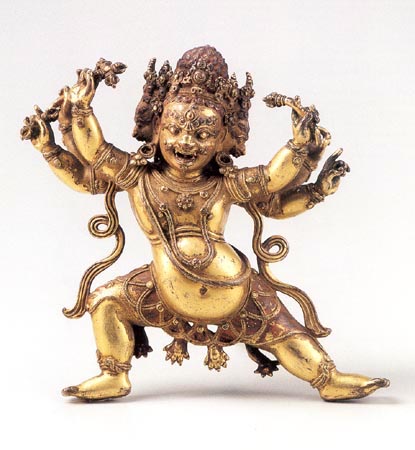Ucchusma: Difference between revisions
Jump to navigation
Jump to search
Stefan Mang (talk | contribs) |
|||
| (4 intermediate revisions by 3 users not shown) | |||
| Line 1: | Line 1: | ||
[[Image:Bhurkumkuta.jpg|frame|Bhurkumkuta, courtesy of Nyingjei Lam]] | [[Image:Bhurkumkuta.jpg|frame|Bhurkumkuta, courtesy of Nyingjei Lam]] | ||
'''Ucchusma''' (Skt. ''Ucchuṣma''; Tib. སྨེ་བརྩེགས་, ''Metsek'', [[Wyl.]] ''sme brtsegs'') — a wrathful form of [[Vajrapani]] who is associated with the purification of defilements and pollution of samaya (''[[Damdrip Nyepa Kunsel]]''). | '''Ucchusma''' (Skt. ''Ucchuṣma''; Tib. སྨེ་བརྩེགས་, ''Metsek'', [[Wyl.]] ''sme brtsegs'') — a wrathful form of [[Vajrapani]] who is associated with the purification of defilements and pollution of samaya (''[[Damdrip Nyepa Kunsel]]''). Ucchuṣma's name is sometimes given as Bhurkumkuta (Skt. ''Bhurkuṃkūṭa'').<ref>Source: [https://www.lotsawahouse.org/topics/ucchusma/ Lotsawa House]</ref> | ||
==Texts== | ==Texts== | ||
The Tibetan [[ | The Tibetan [[Kangyur]] preserves one [[kriya tantra]] dedicated to Ucchusma:<ref>The title of the following text, ''The Mantra Praising the Wrathful King Bhurkuṃkūṭa'', suggests that the deity’s name is Bhurkumkuta. Since the deity is commonly called Ucchusma in Sanskrit, it is unclear where this name comes from. It might be a second, less common name of the deity.</ref> | ||
*'''The Mantra Praising the Wrathful King Bhurkuṃkūṭa''' (Skt. ''krodha bhurkuṃkūṭa rāja stotra mantra''; [[Wyl.]] ''sme brtsegs bstod sngags'', or more fully ''khro bo'i rgyal po sme brtsegs la bstod pa'i sngags'', D 756). | *'''The Mantra Praising the Wrathful King Bhurkuṃkūṭa''' (Skt. ''krodha bhurkuṃkūṭa rāja stotra mantra''; [[Wyl.]] ''sme brtsegs bstod sngags'', or more fully ''khro bo'i rgyal po sme brtsegs la bstod pa'i sngags'', D 756). | ||
==References== | |||
*Bisschop, Peter and Griffiths, Arlo. “The practice involving the Ucchuṣmas (Atharvavedapariśiṣṭa 36)”, ''Studien zur Indologie und Iranistik 24'', 2007, 1–47. | |||
*Sanderson, Alexis. "Atharvavedinsin Tantric Territory: The Āṅgirasakalpa Texts of the Oriya Paippalādins and their Connection with the Trika and the Kālīkula, With critical editions of the Parājapavidhi, the Parāmantravidhi, and the *Bhadrakālīmantravidhiprakaraṇa." In ''The Atharvaveda and its Paippalāda Śākhā: Historical and Philological Papers on a Vedic Tradition'', edited by Arlo Griffiths and Annette Schmiedchen (Aachen: Shaker Verlag, 2007. Geisteskultur Indiens: Texte und Studien, 11. Indologica Halensis), 195–311. | |||
==Notes== | ==Notes== | ||
<small><references/></small> | <small><references/></small> | ||
==External Links== | |||
==External | |||
*{{LH|topics/ucchusma| Ucchusma Series on Lotsawa House}} | *{{LH|topics/ucchusma| Ucchusma Series on Lotsawa House}} | ||
*[https://www.himalayanart.org/search/set.cfm?setID=564 Resource page on Himalayan Art Rousources] | |||
[[Category:Buddhas and Deities]] | [[Category:Buddhas and Deities]] | ||
Latest revision as of 10:58, 29 May 2023

Ucchusma (Skt. Ucchuṣma; Tib. སྨེ་བརྩེགས་, Metsek, Wyl. sme brtsegs) — a wrathful form of Vajrapani who is associated with the purification of defilements and pollution of samaya (Damdrip Nyepa Kunsel). Ucchuṣma's name is sometimes given as Bhurkumkuta (Skt. Bhurkuṃkūṭa).[1]
Texts
The Tibetan Kangyur preserves one kriya tantra dedicated to Ucchusma:[2]
- The Mantra Praising the Wrathful King Bhurkuṃkūṭa (Skt. krodha bhurkuṃkūṭa rāja stotra mantra; Wyl. sme brtsegs bstod sngags, or more fully khro bo'i rgyal po sme brtsegs la bstod pa'i sngags, D 756).
References
- Bisschop, Peter and Griffiths, Arlo. “The practice involving the Ucchuṣmas (Atharvavedapariśiṣṭa 36)”, Studien zur Indologie und Iranistik 24, 2007, 1–47.
- Sanderson, Alexis. "Atharvavedinsin Tantric Territory: The Āṅgirasakalpa Texts of the Oriya Paippalādins and their Connection with the Trika and the Kālīkula, With critical editions of the Parājapavidhi, the Parāmantravidhi, and the *Bhadrakālīmantravidhiprakaraṇa." In The Atharvaveda and its Paippalāda Śākhā: Historical and Philological Papers on a Vedic Tradition, edited by Arlo Griffiths and Annette Schmiedchen (Aachen: Shaker Verlag, 2007. Geisteskultur Indiens: Texte und Studien, 11. Indologica Halensis), 195–311.
Notes
- ↑ Source: Lotsawa House
- ↑ The title of the following text, The Mantra Praising the Wrathful King Bhurkuṃkūṭa, suggests that the deity’s name is Bhurkumkuta. Since the deity is commonly called Ucchusma in Sanskrit, it is unclear where this name comes from. It might be a second, less common name of the deity.